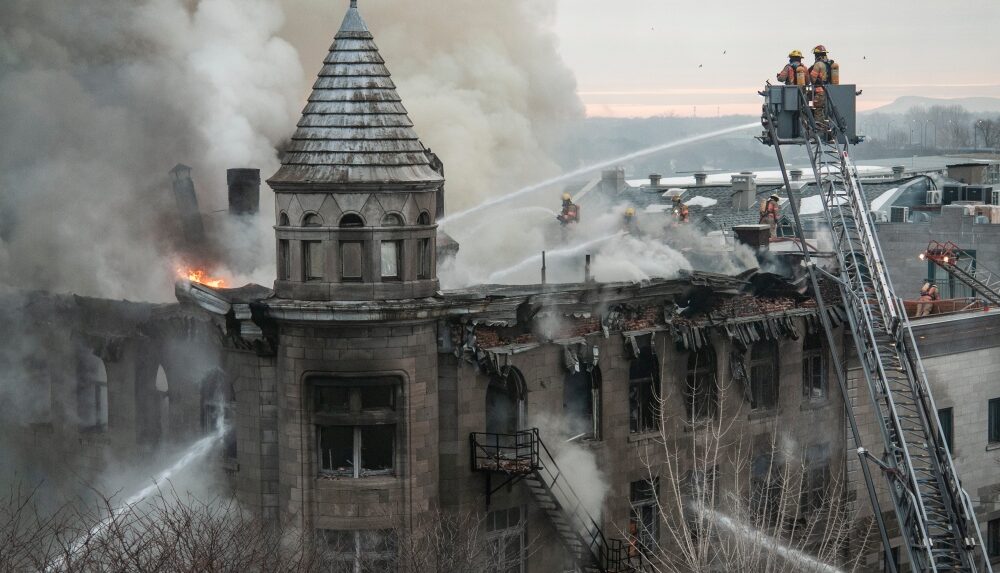Originally conceived out of its founders’ struggles to pay their exorbitant San Francisco rent, Airbnb has become the very thing it had hoped to rectify. Driving rent increases and housing displacement, Airbnb exports risk, shirks responsibility, and generates massive profit.
On March 16, a fire in a historic building in Montreal’s Old Port claimed the lives of seven people. In the weeks following the fire, reports revealed that six out of the seven people who died were staying in illegal Airbnbs. The owner of the building, Emile Benamor, told the CBC that the building was up to code. Yet, multiple reviews left on the now-deleted Airbnb listings reference the absence of windows, amongst other safety concerns. Airbnb property owners don’t need to show proof that they have functioning smoke and carbon monoxide detectors for their listings to be approved by the host company. Unlike hotels, fire exits, smoke detectors, and sprinkler systems are not mandatory. Instead, Airbnb simply urges owners to install and maintain these safety necessities, knowing some will cut corners—but is perfectly willing to accept that reality as it translates to more overall units and fewer funds dedicated to oversight.
The human cost of unregulated Airbnbs is immeasurable. Quebecois photographer and filmmaker Camille Maheux was among those killed in the fire. She had lived in the apartment for over 30 years and survived multiple attempts at illegal eviction. Throughout her career, the 76-year-old photographed the women’s movement and LGBTQIA+ communities—but the archive of her life’s work perished alongside her. Friends from France, Spain, Italy, and Brazil are trying to reassemble the bits and pieces of Maheux’s work the fire didn’t claim. Google her photographs now—they prove quite difficult to find.
In Montreal, over 90 per cent of Airbnbs are unauthorized, rendering fire regulations a nuisance rather than a necessity for landlords. Current Montreal laws stipulate that Airbnb and other short-term rentals (STRs) can only be located on selected strips of the city and must register with the provincial government. However, regulation and enforcement of these policies have been both absent and ineffectual.
An Airbnb spokesperson said that the company will launch a registration field requiring all new listings to provide a permit number. Yet, the lives lost in the Old Port fire illustrate that this introduction of laws is too little, too late. And this has been a staple of Airbnb regulation, which only banned open-invite party listings after a fatal shooting in Pittsburgh. This reactive response to known risks has allowed Airbnb to profit and only address safety concerns after a tragedy forces them to.
While the impact of Airbnb and other short-term rentals has been felt globally, Montreal has experienced particularly devastating effects on its housing market, where the search for affordable housing has become increasingly difficult. Airbnb and other STRs can be far more profitable than long-term rentals, which, in the absence of regulation, creates an economic incentive for landlords to turn units into STRs. Oftentimes, this transition leads to harassment at the hands of landlords and the forcing out of long-term tenants, as was the case with Benamor.
A study conducted in 2017 estimated that 14,000 additional homes would be available for long-term residence across Montreal, Toronto, and Vancouver if they weren’t currently rented as Airbnbs. STRs raise the price of the long-term units that do stay on the market, as people are increasingly willing to buy properties with the intention of renting them out at a profit. Those not personally interested in renting a part of their home are in direct competition with those who are. The existence of a robust STR industry thus takes houses off the market and raises the price of those houses that remain.
It’s time for Airbnb to put the safety and life of its tenants before profits. The Old Port tragedy is a lesson for both the company and the city of Montreal, which must immediately increase and enforce the regulations for short-term rentals.








